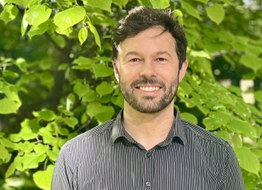Head of the group
Prof. Dr. Philipp Kanske
 © Anja Pixa
© Anja Pixa
Prof. Dr. Philipp Kanske
Send encrypted email via the SecureMail portal (for TUD external users only).
Visiting address:
Chair for Clinical Psychology and Behavioral Neuroscience, Room 315 Chemnitzer Str. 46
01187 Dresden
Office hours:
Appointments after previous agreement. Please send an e mail.
Philipp Kanske is Professor for Clinical Psychology and Behavioral Neuroscience at Technische Universität Dresden. He explores the emotional and cognitive processes that enable social behavior and their alterations in psychopathology. In his work he uses magnetic resonance imaging (MRI) and electroencephalography (EEG) to describe the underlying neuronal mechanisms.
I support the Open Science Initiative of the Faculty of Psychology.
Academic experience
|
since 2017 |
Professor for Clinical Psychology and Behavioral Neuroscience, Technische Universität Dresden |
|
2012 – 2017 |
Group Leader „Psychopathology of the Social Brain” at the Department of Social Neuroscience, Max Planck Institute for Human Cognitive and Brain Sciences, Leipzig |
|
2011 – 2012 |
Research staff at Heidelberg University, Department of Psychiatry, Section of Experimental Psychopathology and Neuroimaging, Heidelberg |
|
2009 – 2011 |
PostDoc at the Central Institute of Mental Health, Institute of Cognitive and Clinical Neuroscience, Mannheim |
Education
|
2014 |
Habilitation at Heidelberg University |
|
2011 |
Licensed Psychotherapist |
|
2008 |
Dr. rer. nat. at the University of Leipzig |
|
2005 |
Dipl.-Psych. at Technische Universität Dresden |
|
2004 |
M.Sc. at the University of Oregon, USA |
Honors and awards
| 2023 | ERC consolidator grant "INTERACT - The interplay of neural networks enabling social interaction" |
|
2017 |
Heinz Maier-Leibnitz Award of the German Research Foundation |
|
2015 - 2020 |
Member of the Young Academy at the German National Academy of Sciences Leopoldina and the Berlin-Brandenburg Academy of Sciences and Humanities (2019 - 2020 Speaker, 2018 - 2020 Member of the Board) |
|
2013 |
Lilly Young Investigator Fellowship in Bipolar Disorder at the International Conference on Bipolar Disorder |
|
2013 |
Young Investigator Award of the European Brain and Behaviour Society |
|
2013 |
„Rising Star” of the Association for Psychological Science |
|
2012 |
Young Investigator Award of the German Society for Psychophysiology and its Application |
|
2008 |
Otto Hahn Medal of the Max Planck Society |
|
2006 |
Werner Straub Award of the Department of Psychology at Technische Universität Dresden |
Publications
2013
-
Neural Correlates of Emotional Distractibility in Bipolar Disorder Patients, Unaffected Relatives, and Individuals With Hypomanic Personality, Dec 2013, In: American Journal of Psychiatry. 170, 12, p. 1487-1496, 10 p.Electronic (full-text) versionResearch output: Contribution to journal > Research article
-
Emotional modulation of the attentional blink and the relation to interpersonal reactivity, 11 Oct 2013, In: Frontiers in human neuroscience. 7, 9 p., 641Electronic (full-text) versionResearch output: Contribution to journal > Research article
-
Deficient modulation of pain by a positive emotional context in fibromyalgia patients, Sep 2013, In: Pain. 154, 9, p. 1846–1855, 10 p.Electronic (full-text) versionResearch output: Contribution to journal > Research article
-
How working memory training improves emotion regulation: Neural efficiency, effort, and transfer effects, 24 Jul 2013, In: Journal of Neuroscience. 33, 30, p. 12152-12153, 2 p.Electronic (full-text) versionResearch output: Contribution to journal > Comment/Debate
-
Indirect assessment of an interpretation bias in humans: Neurophysiological and behavioral correlates, Jun 2013, In: Frontiers in human neuroscience. 7, 272Electronic (full-text) versionResearch output: Contribution to journal > Research article
-
Reprint of "Effortful control, depression, and anxiety correlate with the influence of emotion on executive attentional control", Mar 2013, In: Biological psychology. 92, 3, p. 456-463, 8 p.Electronic (full-text) versionResearch output: Contribution to journal > Research article
2012
-
Effortful control, depression, and anxiety correlate with the influence of emotion on executive attentional control, Sep 2012, In: Biological psychology. 91, 1, p. 88-95Electronic (full-text) versionResearch output: Contribution to journal > Research article
-
On the influence of emotion on conflict processing, 9 Jul 2012, In: Frontiers in Integrative Neuroscience. 6, 4 p., 42Electronic (full-text) versionResearch output: Contribution to journal > Comment/Debate
-
Neural correlates of emotion regulation deficits in remitted depression: the influence of regulation strategy, habitual regulation use, and emotional valence, 2 Jul 2012, In: NeuroImage. 61, 3, p. 686-693, 8 p.Electronic (full-text) versionResearch output: Contribution to journal > Research article
-
Goal-directed behavior under emotional distraction is preserved by enhanced task-specific activation, 1 Feb 2012, In: Social cognitive and affective neuroscience. 8, 3, p. 305-312, 8 p.Electronic (full-text) versionResearch output: Contribution to journal > Research article
